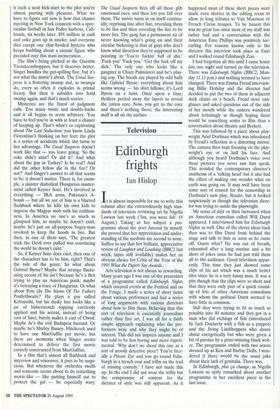Television
Edinburgh frights
Ian Hislop
It is almost impossible for me to write this column after the extraordinarily high stan- dards of television reviewing set by Nigella Lawson last week (Ian, you were lab' 19 August.) Taking as her subject a pro- gramme about the poet Juvenal by myself, she proved that her appreciation and under- standing of the medium are second to none. Suffice to say that her brilliant, appreciative review of Laughter and Loathing (BBC2 last week, tapes still available) makes her an obvious choice for Critic of the Year at the 1995 What the Papers Say Awards.
Arts television is not always so rewarding. Many years ago I was one of the presenters of a programme called Edinburgh Nights which covered events at the Festival and on the Fringe. I made a series of short items about various performers and had a series of long arguments with various directors about how to film them. Believing that this sort of television is essentially journalism rather than fine art, I was all for a fairly simple approach explaining who the per- formers were and why they might be of interest. This did not impress anyone and I was told to be less boring and more experi- mental. 'Why don't we shoot this one as a sort of moody detective piece? You're liter- ally a Private Eye and you go round Edin- burgh in a trench coat and trilby on the trail of missing comedy.' I have not made this up. In the end I did not wear the trilby but the compromise of content for the dictates of style was still apparent. As it happened most of these short pieces were made even shorter in the editing room to allow in long tributes to Van Morrison or French Circus troupes. To be honest this was no great loss since most of my stuff was rather bad and a conversation with the American Emo Phillips was positively toe- curling. For reasons known only to the director this interview took place as Emo and I walked round Edinburgh Zoo.
I had forgotten all this until I came home late one night and turned on the television. There was Edinburgh Nights (BBC2, Mon- day 11.15 p.m.) and nothing seemed to have changed. There was Emma Freud interview- ing Billie Holiday and the director had decided to put the two of them in adjacent deck chairs on a beach. Freud wore sun- glasses and asked questions out of the side of her mouth while the camera wandered about irritatingly as though hoping there would be something sexier to film than a conversation about theatre and Beckett.
This was followed by a piece about play- wright Ariel Dorfman which was introduced by Freud's reflection in a distorting mirror. The camera then kept focusing on the play- wright's eye or on half his face. And although you heard Dorfman's voice over these pictures you never saw him speak. This avoided the contemporary director's anathema of a 'talking head' but it also had the effect of making one wonder what on earth was going on. It may well have been some sort of conceit for the censorship in Dorfman's new play, Reader, but it looked suspiciously as though the television direc- tor was trying to outdo the playwright.
My sense of déjà vu then increased when an American comedian called Will Durst appeared. I interviewed him for Edinburgh Nights as well. One of the clever ideas back then was to film Durst from behind the stage and talk to him as soon as he came off. Guess what? He was out of breath, exhausted after a long routine and a bit short of jokes since he had just told them all to the audience. Good television appar- ently. This time they just showed some clips of his act which was a much better idea since he is a very funny man. It was a pity though that the clips were so short and that they were only part of a quick round- up of lots of other American comedians with whom the political Durst seemed to have little in common.
Still they were trying to fit as much as possible into 40 minutes and they got in a man who did etchings of fish (introduced by Jack Docherty with a fish as a puppet) and the Jiving Lindihoppers who dance about energetically but who were given a bit of gravita,s by a prize-winning black writ- er. The programme ended with two actors dressed up as Ken and Barbie Dolls. I won- dered if there would be the usual joke about their lack of genitalia. There was.
In Edinburgh, plus ca change, as Nigella Lawson so aptly remarked about another programme in her excellent piece in the last issue.


















































 Previous page
Previous page